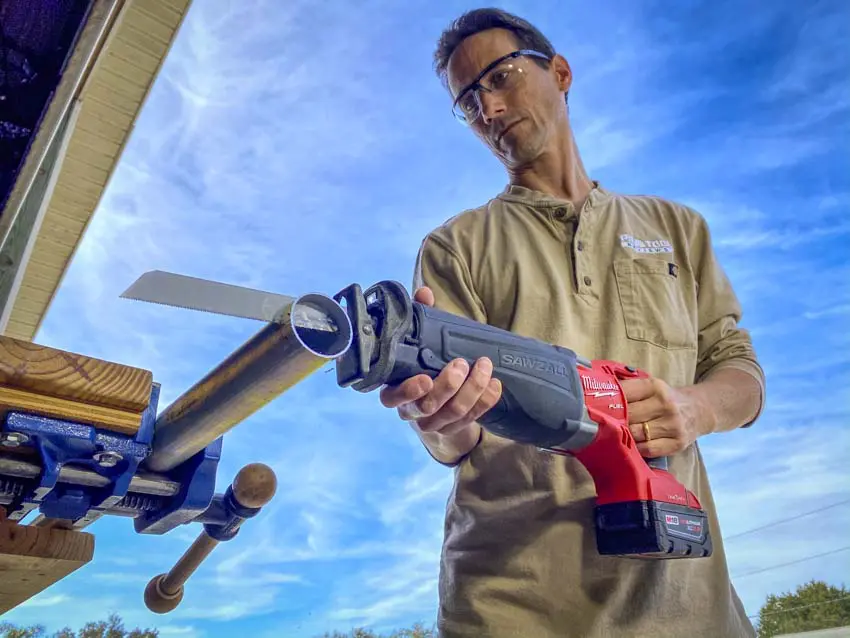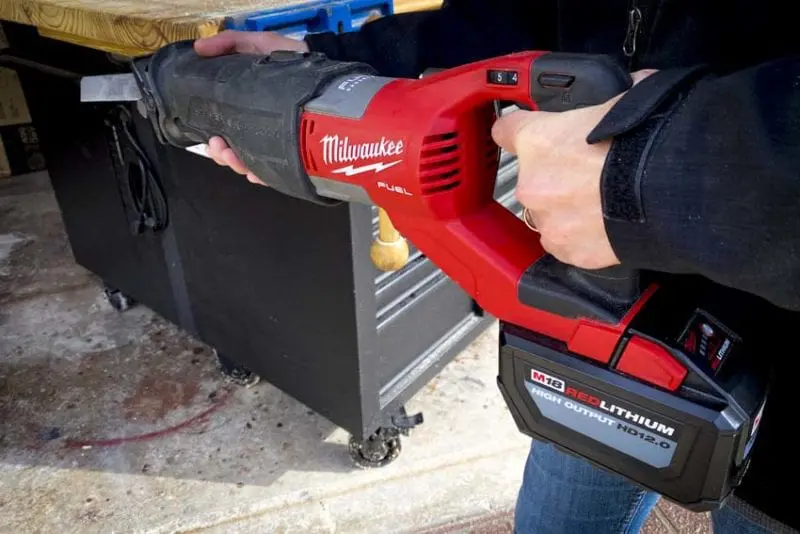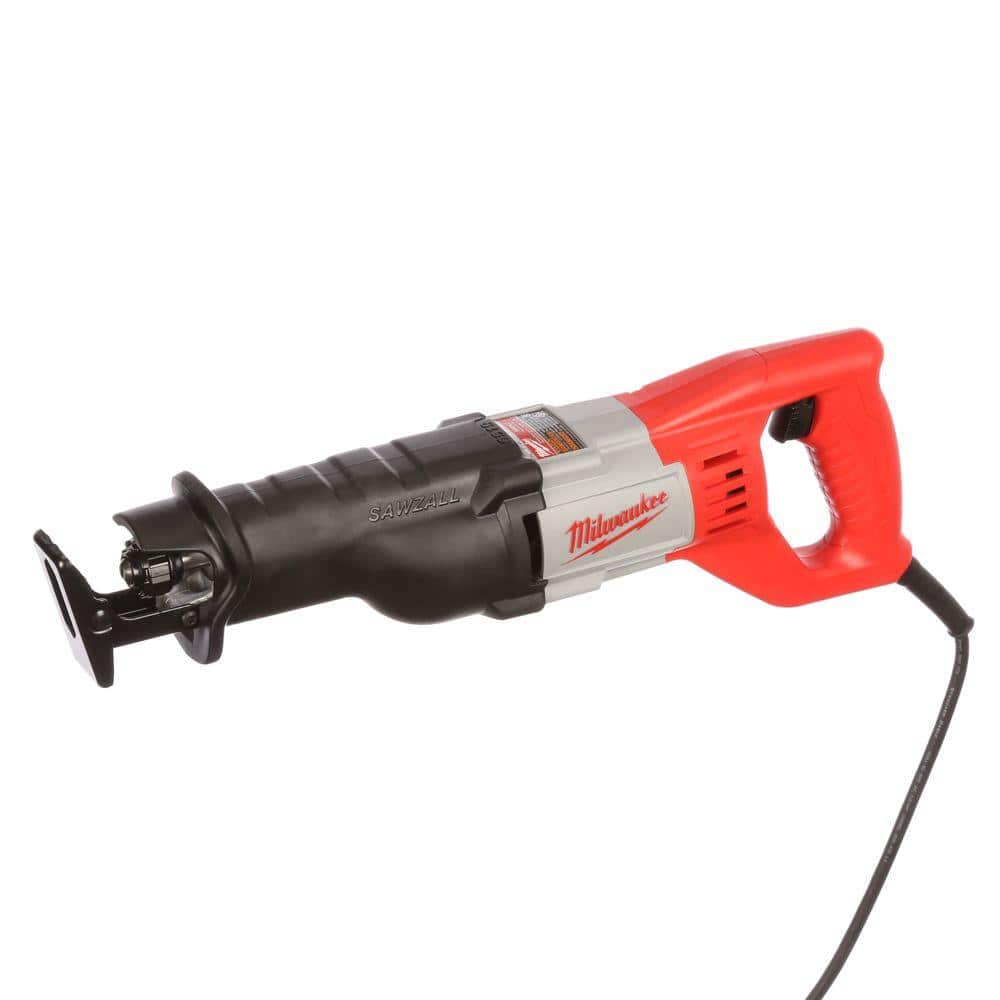Yes, a reciprocating saw is often referred to as a Sawzall. The term “Sawzall” is a brand name by Milwaukee Tool, but it is commonly used for all reciprocating saws.
A reciprocating saw is an essential tool in construction and demolition. It excels at cutting through various materials like wood, metal, and plastic. Featuring a back-and-forth motion, it allows for precise and efficient cuts in tight spaces.
Professionals and DIY enthusiasts alike appreciate its versatility and power.
The ability to quickly swap blades makes it suitable for different tasks, from home renovations to heavy-duty projects. Understanding how to use a reciprocating saw can enhance your toolset and streamline your work.
Whether you’re tackling a simple task or a complex job, this tool can significantly increase your efficiency.
Introduction To Reciprocating Saws
A reciprocating saw is a powerful tool. It cuts through various materials quickly. This saw is often used in construction and DIY projects. Many people ask, “Is a reciprocating saw a Sawzall?” Let’s explore this tool further.

Credit: www.protoolreviews.com
The Basics Of A Reciprocating Saw
A reciprocating saw features a straight blade. This blade moves back and forth rapidly. It is ideal for cutting wood, metal, and plastic.
| Component | Function |
|---|---|
| Blade | Cuts through materials |
| Motor | Powers the blade movement |
| Handle | Provides grip and control |
| Trigger | Controls the speed of the blade |
Different blades work for different materials. Always choose the right blade for your task. This ensures safety and efficiency.
Common Uses In Diy And Construction
Reciprocating saws have many applications. Here are some common uses:
- Cutting through wood for framing
- Demolition of walls and structures
- Trimming trees and branches
- Cutting metal pipes
- Removing old fixtures
Many professionals use this tool on job sites. DIY enthusiasts also find it handy at home.
- Choose the right blade type.
- Wear safety gear, like goggles.
- Keep hands away from the blade.
- Secure the material before cutting.
- Follow the manufacturer’s instructions.
The Sawzall: A Milwaukee Legacy
The Sawzall is more than just a tool. It represents a rich history of innovation. Milwaukee Tool introduced it in 1951. This tool changed the way people think about cutting. The name “Sawzall” became synonymous with reciprocating saws.
Origins Of The Sawzall
The story of the Sawzall began in Milwaukee, Wisconsin. Milwaukee Tool sought to create a powerful tool for professionals. They developed the first reciprocating saw designed for heavy-duty use.
- Launched in 1951
- Designed for construction and demolition
- First tool with a variable speed trigger
These features made the Sawzall a favorite among tradespeople. It provided versatility and efficiency. The Sawzall quickly became a staple in job sites.
Brand Recognition And Impact
The Sawzall changed the landscape of power tools. Today, it holds a strong brand recognition. Professionals and DIY enthusiasts trust the name.
| Feature | Impact |
|---|---|
| Durability | Lasts longer under tough conditions |
| Versatility | Can cut through various materials |
| Ease of Use | Simple design for quick learning |
Milwaukee continues to innovate with new models. The brand’s legacy lives on in the Sawzall. It remains a key player in the power tool market.
Comparing Sawzall And Reciprocating Saws
Understanding the differences between a Sawzall and a reciprocating saw is essential. Many people use these terms interchangeably. Let’s dive into the similarities and unique features of both tools.
Technical Similarities
Both the Sawzall and the reciprocating saw share several technical aspects:
- Both have a back-and-forth motion.
- Each uses interchangeable blades.
- Both can cut through wood, metal, and plastic.
- They are portable and easy to handle.
- Both tools operate with electric or battery power.
| Feature | Sawzall | Reciprocating Saw |
|---|---|---|
| Blade Type | Interchangeable | Interchangeable |
| Power Source | Electric/Battery | Electric/Battery |
| Cutting Motion | Reciprocating | Reciprocating |
| Weight | Varies by model | Varies by model |
Brand-specific Features
Different brands offer unique features for their tools. Here are some key points:
- Milwaukee – Known for durability and power.
- DeWalt – Focuses on lightweight designs.
- Makita – Offers advanced battery technology.
- Ryobi – Budget-friendly options with solid performance.
Each brand provides various models. These models cater to different needs. Consider your specific tasks before making a choice.

Credit: www.amazon.com
Terminology In The Tool World
Understanding terminology in the tool world can be confusing. Different terms describe similar tools. Knowing these terms helps in making informed choices. Let’s explore the difference between generic and proprietary terms.
Generic Vs. Proprietary Terms
Generic terms describe categories of tools. Proprietary terms refer to specific brands or models. A reciprocating saw is a generic term. Sawzall is a proprietary term for Milwaukee’s brand.
Here’s a quick comparison:
| Type | Example |
|---|---|
| Generic | Reciprocating Saw |
| Proprietary | Sawzall |
Many brands have similar tools. Users often use brand names for all tools. This leads to confusion among DIY enthusiasts and professionals alike.
The Impact Of Branding On Language
Branding shapes how we talk about tools. Popular brands often dominate conversations. People use brand names instead of generic terms.
- Sawzall for reciprocating saws
- Kleenex for facial tissues
- Band-Aid for adhesive bandages
These examples show how branding influences our language. It creates a common understanding but also confusion.
Knowing the difference helps buyers choose wisely. It ensures you select the right tool for your project.
Choosing The Right Tool For The Job
Choosing the right tool can make a big difference. A reciprocating saw and a Sawzall are often confused. Knowing their differences helps you select the best option for your needs. Let’s explore how to choose wisely.
Assessing Your Needs
Start by identifying the tasks you plan to tackle. Different jobs require different tools. Here are some common uses for a reciprocating saw:
- Cutting through wood.
- Demolition work.
- Trimming branches.
- Piping and plumbing tasks.
Consider the materials you will cut. Some saws perform better with specific materials.
Think about the frequency of use. Occasional use may not require high-end models.
Considering Quality And Price
Quality often impacts performance. High-quality tools last longer and work better.
Check the price range. Here’s a simple table for better understanding:
| Tool Type | Price Range | Quality Level |
|---|---|---|
| Basic Reciprocating Saw | $50 – $100 | Good for light tasks |
| Mid-Range Reciprocating Saw | $100 – $200 | Suitable for most tasks |
| High-End Sawzall | $200+ | Best for heavy-duty work |
Read reviews before buying. They provide insights into quality and performance. Compare features and warranties. A good warranty indicates manufacturer confidence.
Choose wisely to ensure your tool meets your needs and budget.
Maintaining Your Saw For Longevity
Proper maintenance is key to keeping your reciprocating saw, often called a Sawzall, in top shape. Regular care extends the tool’s lifespan and ensures optimal performance. Understanding how to maintain your saw can save time and money.
Best Practices For Care
- Clean After Use: Remove debris after each project.
- Inspect Blades: Check for wear and replace dull blades.
- Lubricate Moving Parts: Use light oil to keep parts moving smoothly.
- Store Properly: Keep in a dry place to avoid rust.
- Check Cords: Inspect power cords for damage regularly.
Troubleshooting Common Issues
Sometimes, a reciprocating saw can face issues. Here are some common problems and quick fixes:
| Issue | Possible Cause | Solution |
|---|---|---|
| Tool Won’t Start | Power source issue | Check power cord and outlet. |
| Excess Vibration | Blade is loose | Tighten the blade securely. |
| Overheating | Continuous use | Let the tool cool down. |
| Blade Stuck | Wood or material is jammed | Gently wiggle the saw to free it. |
By following these best practices and troubleshooting tips, you can keep your Sawzall working effectively for years. Regular maintenance leads to smoother operation and reduced frustration during projects.
Attachments And Accessories
Attachments and accessories enhance the functionality of your reciprocating saw. They allow for a wider range of tasks. Choosing the right add-ons can significantly boost efficiency. Let’s explore some exciting options available for your saw.
Enhancing Your Saw’s Capabilities
Various attachments can transform a standard reciprocating saw into a versatile tool. Here are some popular options:
- Blade Types: Different blades cut through various materials.
- Extension Handles: Provide extra reach for hard-to-access areas.
- Dust Blowers: Keep your work area clear of debris.
- Depth Stops: Control cutting depth for precision work.
These attachments help in tackling specific projects with ease. Understanding what each attachment offers is crucial for optimal performance.
Must-have Add-ons For Professionals
Professionals often rely on specific add-ons for better results. Here’s a list of must-have accessories:
| Accessory | Purpose |
|---|---|
| Specialty Blades | For cutting metal, wood, or drywall. |
| Carrying Case | Protects tools and makes transport easier. |
| Blade Lubricant | Reduces friction and extends blade life. |
| Battery Packs | Ensures longer usage without interruptions. |
Investing in these accessories can enhance productivity. The right tools ensure that you complete projects efficiently.

Credit: www.protoolreviews.com
Future Of Reciprocating Saws
The future of reciprocating saws looks bright and exciting. Technology is evolving rapidly. New features will enhance performance and user experience. Innovations promise to make these tools more versatile.
Innovations On The Horizon
Many advancements are expected in reciprocating saw design. Here are some key innovations:
- Brushless Motors: These motors offer more power and efficiency.
- Smart Technology: Sensors will optimize cutting speeds automatically.
- Compact Designs: Lighter models will improve portability and ease of use.
- Enhanced Battery Life: Longer-lasting batteries will reduce downtime.
Manufacturers are focusing on user-friendly features. Ergonomic grips will reduce fatigue. Integrated LED lights will improve visibility in dark spaces.
Predictions For Brand Dominance
Several brands are likely to lead the market in the coming years. Key players include:
| Brand | Strengths | Market Share |
|---|---|---|
| Milwaukee | Durability and innovation | 30% |
| DeWalt | Versatile tool options | 25% |
| Makita | Lightweight designs | 20% |
| Bosch | Precision engineering | 15% |
| Ryobi | Affordability | 10% |
Brands will need to adapt to consumer preferences. Sustainability will become a key focus. Eco-friendly materials and practices will be essential.

Credit: www.homedepot.com
Frequently Asked Questions
- Is A Reciprocating Saw The Same As A Sawzall?
Yes, a Sawzall is a brand of reciprocating saw, popular for its versatility and power.
- What Is A Reciprocating Saw Used For?
Reciprocating saws cut through various materials like wood, metal, and plastic, making them ideal for demolition and renovation.
- Can You Use A Sawzall For Woodworking?
Yes, a Sawzall can effectively cut wood, especially for rough cuts and demolition tasks.
- What Blades Fit A Reciprocating Saw?
Reciprocating saws use various blades, including wood, metal, and bi-metal options, designed for different cutting tasks.
- Is A Sawzall Suitable For Beginners?
Yes, a Sawzall is user-friendly and perfect for beginners tackling DIY projects or home improvements.
Conclusion
A reciprocating saw and a Sawzall are often viewed as the same tool. Both serve similar purposes and share key features. Understanding their differences can enhance your DIY projects.
Whether you choose a reciprocating saw or a Sawzall, you’ll have a powerful tool for cutting various materials effectively.
Choose wisely for your needs.
